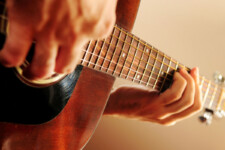Is Bass Guitar Needed in A Band? (Deciding for Your Band)
In a world where guitarists are typically regarded as the most important member of a band, the bass guitar has been relegated to the back of the queue when putting together your dream band lineup.
But is the idea that bass guitar isn’t important a fair point or a misunderstanding of the instrument propped up by the guitar’s significance in popular culture?
To tell you the truth, when it comes down to the most important instruments in a band, the bass guitar is one of the few instruments you can’t go without. If you’re going to exclude it from your band you need to make sure you find a way to fill the bassless void it will take away with it.

What Benefit Does Bass Bring to A Band?
Without a Bass guitar in the mix, you’re going to be left with a sound that lacks a groove and a low end.
Bass guitar provides all of the low end sounds of a band (bar the kick drum on a drum kit). Without it, your sound is limited in range with only mid and high frequency instruments providing all the music.
This can leave your music sounding flat as all the instruments compete for dominance of those higher frequencies. Bringing a bass into the band gives you more tonal diversity giving you a bigger and more rounded sound.
Bass guitar also acts as a guide to the rest of the band. While you might think that is entirely the job of the drummer it’s not the case. The bass and drums work hand in hand to drive the music along.
Bass in particular takes the lead role for what chords and notes are being played. It is this lead that instruments like the guitar and keyboard will follow.
This is particularly useful when playing in a band that uses a lot of effects like distortions of delays.
These effects sound great to the audience but can make hearing what is being played while on stage a bit difficult. The bass guitar powers through those effects and delivers a clean tone that can be heard over the chaos.
Having a bass in your band also frees up space for guitar solos and improvisation.
Keeping the bass line running while the guitarist rips up some solo work will give them something to solo over instead of the entire rhythm of the track dropping off to make way for the solo.
How Important Is Bass in a Band?
Bass guitar provides the backbone of any band, creating a very important element in your music; its rhythm and groove.
It doesn’t matter how many instruments are on stage; when we dance we only dance to two of them. That seems a bit far-fetched but here me out.
Bass and Drums provide the rhythm of a song. They’re the driving force that the rest of the band follows, with the drums creating the beat and the bass taking responsibility for the main groove of the track.
The rest of the band is simply following these two instruments along, adding the flair and personality through melodies and harmonies.
So the bit we all dance along to can be considered the soul of the track, the underlying rhythm that keeps everything together but also keeps the song moving forward. Without them the band would get lost, the singer would get lost, and the people dancing in the crowd would get lost.
This symbiotic relationship between the drums and bass also serves another purpose. To keep the drums in check.
While you might think drums are just beat driven robots, they too can fall out of time. A lot of drummers rely on the consistency and repetition of the bass line to keep themselves in check and make sure they stay in time.
Can Bands Sound Good Without Bass Guitar?
Of course, a band can sound great without a bassist… if they’re a band that set out specifically to be a band without a bassist.
Taking away the bass from a band can often lead to you sounding like nothing more than a band without a bassist and if this is the case it’s glaringly obvious.
Lineups consisting of just a drummer and a guitarist can often be a disappointing live experience leading people to ask “where’s the bassist? they’ve got no low end.”
If you’re a band that has made the conscious decision to move away from a bass guitar you need to find a way to fill in what you’re taking away. But more on that later.
Is Bass Guitar Underrated in Bands?
We’ve all heard the classic rock n roll complaints about the bass guitar. Some say the only people that play bass are failed guitarists that couldn’t cut it as a lead or rhythm played. Another is that people only play bass because it’s easier, with 4 strings instead of 6 it must be the case right?
Well, the truth is that bass is highly underrated and that is largely due to the massive amount of space that the guitar takes up in popular culture.
When you see a photo or music video of a huge band which members are usually front and center?
The singer and the guitarist. This image of the bass player being a behind the scenes member has given them a reputation for being an unimportant extra in a band.
In reality, I can guarantee those in the band have a deep appreciation and respect for their bass player and it was their marketing manager that pushed him to the back of the photograph!
What Types of Bands Can Work Without Bass Guitar?
While I have made it clear how important I believe the bass is, there are some exceptions where the lack of a bass guitar makes total sense!
The turn of the century saw a rise in the popularity of electronic music across the board. Electronic groups will still often make use of the electric guitar as the sound and feel of the instrument is hard to replicate or synthesize.
Drums and bass on the other hand lend themselves excellently to electronic synthesis. Through the use of synthesizers and MIDI keyboards, these groups can synthesize their basslines removing the need for 4 string bass guitar.
The techniques used by electronic-based bands don’t just replace the bass guitar but turn bass into something completely new. Synthesizers give players the ability to take any sound and pitch it down into the frequency range of a bass creating whole new ways to texture and create bass lines.
Another genre that can often get away with ditching the bass player is indie and garage rock. The often dry and lo-fi sound of these bands makes the lack of bass less noticeable and can help give the music a lighter feel.
How To Cover Bass Parts with Other Instruments
As I mentioned before if you want to start a band without a bass player, most of the time you need to find a way to replace what your sound will lack with something else.
Luckily for you, you won’t be the first band to try. Some very popular music has been made in the absence of a bass player.

Using Keyboards to Cover Bass Parts
One solution to not having a bass player is to hand their part over to a keyboard player. The huge range of sounds available on a keyboard or synth means you can play those low frequencies the bass is supposed to take up.
This is exactly what The Doors did. Never officially bringing a bass player into their midst meant the band had to find a way to play their songs live with one. All but a single member of The Doors were never trained as musicians; the one who was however came up with a solution to their problem.
Using his left hand The Doors keyboardist Ray Manzarek performed all of the bass parts for their songs on his keyboard while playing live. Not to mention he did this while also playing the keyboard melodies.
Using Pitch Shifting Pedals to Cover Bass Parts
Another solution to a lack of bass is to use pitch shifting guitar pedals. Pitch shifters and octave pedals work by taking your guitar’s sound and pitching it either up or down.
This technique was used by punk rockers Sleater-Kinney, a band with 2 guitarists and a drummer. By using pedals the band was able to replicate the low end of a bass by applying pitch shifters to their guitars to step in for a dedicated bass player.
Using Baritone Guitar to Cover Bass Parts
If neither of those suits you then there is one more unique option out there. There is a special type of guitar that is capable of sounding a bit more like a bass than a standard 6-string.
Baritone guitars feature a longer scale neck that a typical guitar as well as a larger body and a more heavy-duty bracing. This combination of modifications to the design of the guitar allows it to be tuned lower than usual getting the guitar well within the range of a bass.
Its longer scale neck also means you aren’t limited to only bass-like tones. You can tune the guitar down so that the top of the neck starts lower than a usual guitar while providing your mid tones higher up the neck.
This was the exact logic behind the band The Evans who wanted to keep a two person lineup without skimping on bass. It’s a great compromise for a bass player if you’re a skilled guitarist looking for bit of a challenge.




